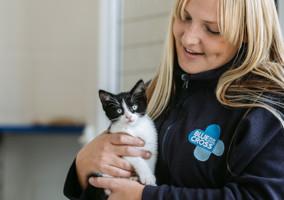For millions of people across the UK, having access to the internet – whether via a mobile, a laptop, tablet, or other devices – is not a luxury, it is an essential. The onset of the Covid-19 pandemic meant the importance of being connected grew further. As offices closed, restaurants, shops and sports clubs became ‘no go’ areas and even setting foot in someone else’s house was prohibited, the huge reliance on the online world became even greater.
It also exposed the profound digital divide that exists between those who ‘have’ and those who ‘have not’ when it comes to devices, data and digital skills.
A stark divide
Two million households, which equates to around 7 million people, are without access to the internet and 22% of the UK population lack basic digital skills. The children in these households, many in rural and hard to reach areas, are at risk of falling – and being left – further behind in their education. The adults seeking work are missing opportunities to find and apply for jobs. And the much-needed contact with friends and family is even further away at a time when connection is needed more than ever.
There is a strong association between digital exclusion and poverty – people with an annual household income of £50,000 or more are 40% more likely to have Foundation digital skills, than those earning less than £17,499.
At Catch22, our staff work with more than 120,000 people a year, many of whom would be classed as hard to reach or vulnerable. We run a number of alternative provision schools for pupils unable to access mainstream education. We support those in prison and prison leavers to re-integrate into society. We run employability programmes to help people into training, apprenticeships and jobs. We support young people and families struggling with their mental health, with substance misuse or who are being exploited.
As such, we’ve witnessed the real effects of digital exclusion.
Our teachers reported giving doorstep lessons to parents on how to use a laptop and get their children online to access homeschooling
Many of the young people we work with who recently left the care system had difficulty accessing the government scheme to provide laptops – or if they did receive a device struggled with lack of data. They felt isolated from friends and unable to access employment and training opportunities online
Job-seekers we worked with struggled to apply for jobs without access to the internet and a device to complete online applications. In some cases, career coaches had to complete forms over the phone.
National and local action
Over the course of the pandemic, we’ve seen various schemes – some national and many local – to tackle digital poverty.
The government has worked with some network providers, including Tesco Mobile, Giffgaff, and the Post Office, to provide deals for frontline staff and low-income families. Phone companies have stepped up to offer support too, including BT’s partnership with the Department of Education, opening up its Wi-fi hotspots to give school children six months of free internet access. BT and Three offered free data and unlimited broadband for children at home during lockdown. Vodafone gave giving 350,000 SIM cards with 30GB of data to disadvantaged students and at the start of the first lockdown, 02 and HubBub trialled #CommunityCalling in Southwark which, due to its success, is now being extended to other areas.
Civil society organisations have been key to facilitating many of these partnerships and distributing devices to those who need them most. The Good Things Foundation talks about the importance of ‘hyperlocal’ to reach, support and engage people and help fix the digital divide.
FutureDotNow, a coalition of leading companies and civil society groups, launched DevicesDotNow – which called for businesses to gather devices and connectivity to help the people without internet access UK to get online. With the support of partners, 11,000 people are now benefitting from devices, connectivity and support.
The relatively new Digital Access for All coalition brings together many of the organisations already doing fantastic work in this area and has recently launched The Digital Poverty Alliance, to bring like-minded organisations together to eliminate digital poverty.
There is clearly a lot going on – but what will take to make it a reality?
100% digital inclusion by 2030
Digital inclusion is a key part of levelling-up and is essential for improving peoples’ lives. If we are to become a truly digitally-enabled nation, with everyone – whatever their background or location – having access to appropriate devices, data and the skills they need, there must be a national commitment to tackling the problem.
At Catch22, we’ve recently launched our ‘Vision for a Digitally Included Britain’. We are calling on government to adopt this as part of a National Digital Inclusion Strategy – and commit to a target of 100% digital inclusion by 2030.
To achieve this, the focus should be on data, devices and skills. You can read our recommendations in full in our Vision, but they include:
Devices:
Government should work with local civil society organisations to accurately assess the need for devices amongst services users – as part of a long-term, sustainable model.
Government should work with tech companies and hardware providers to provide high quality refurbished devices to meet needs, building on some of the good work started during the pandemic.
Data:
Social tariffs should be introduced by mobile phone and broadband providers, with data prices tiered depending on household income.
Data donation schemes should be explored so that individuals with excess monthly data can donate it, via local third sector organisations, to those unable to afford it.
Skills:
A fund for specific digital skills training targeted at socially excluded groups, such as those in prison and leaving prison, those in care and leaving care, harder to reach community groups including non-English speakers and older generations.
Digital skills training to be included as part of the national curriculum.
Melissa Milner, director of communications and engagement at Catch22
Related articles











